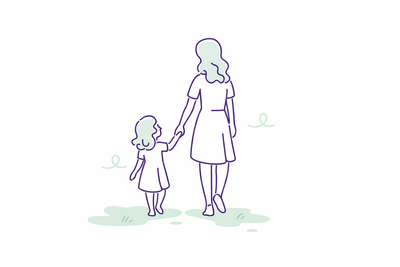
“Stop doing that, or I’ll call the police”, “Don’t go there, or a monster will get you”.
Although we were raised hearing these sentences, and might think they’re innocent, the flow of emotions and memories they bring with them in the long term is harmful for our children: it teaches them that fear is a tool to manipulate people, it teaches them to blindly listen to authorities instead of using their critical mind, and once they learn the truth (it’ll happen sooner than later) it teaches them not to trust us.
I want to tell you an anecdote.
There was a gorgeous nursery/school near our home in Bali (if you land on this blog just now, we’re traveling the world for two years), which has a coffee shop with a Kids Club where kids can play supervised by staff, while parents work, or enjoy a coffe.
The first day Oliver and Emily loved it and came out happy. The manager told me that Emily cried briefly for me, but then she stopped so they didn’t take her to me as I had asked them to do (I was waiting at the coffee shop across the hall).
The second day Emily said she didn’t want to go in, but changed her mind when she saw that there were different care givers (back then I couldn’t yet connect the dots, though).
On the third day, Emily didn’t want to go in. “I don’t like the person”, pointing at one of the care givers. I let Oliver go in by himself, and kept Emily with me, so we could talk it out. “She said that she calls the firefighters if I cry, but I don’t”. Oliver later confirmed that the lady on the first day had said she’d call the police if Emily kept crying.
Emily is three, she’s very vocal, she knows what she wants, and if she doesn’t want something she makes herself respected. I’m the kind of parent who understands, listens, believes in my (all) children and never dismisses emotions. I talked with Oliver and Emily about how it’s not right nor fair to say things that aren’t true just to scare somebody; I also suggested that if a stranger ever says something scary/upsetting that they have never heard from Alex or me, they can simply say, “I don’t believe it, I’ll ask my mom”.
But not every child is like Emily, and not every parent takes their child’s word: another child might not be able to explain, another parent might not believe him. Another parent might think “my child is being difficult”, dismiss his emotion and send him to nursery anyway. The child might not cry that day for fear of the police coming, so the care giver might not “have to” threaten again.
The situation will seem resolved, but the child will have a new scar in his heart and mind.
Using the police, monsters or any authority (including God, if you are a believer) as a threat to make children behave, or as a negative consequence to children’s uncomfortable behaviours is WRONG. Threatening a child, using fear to make him behave or act as we want, and playing on a child’s incapability to spot a lie, is NEVER RIGHT, in no family, school, nursery, circumstance, and culture.
That same day, I made this very clear with the manager and the staff of the play area, and the day after, Oliver and Emily had a conversation:
Oliver, “Emily, do you want to come to the play area with me?”
Emily, “No”.
Oliver, “But mommy told her not to say that”
Emily, “Ok, let’s go”.
It wasn’t Oliver to convince her, of course. Emily felt strong because she now knew that what the care giver said was wrong and she now had the tools to respond.
It was an amazing lesson for everybody involved (hopefully also for the kids club, which I reluctantly decided to use again because the kids wanted to), and it made me realise once more what a huge difference there is between a nursery that uses “traditional ways” (rewards for good behaviours, punishments for bad ones, empty threats, fear as a control technique…) and one that is based on respect for the child, honesty, positive discipline and gentle education (like any traditional Montessori school).
And although it’s not always possible to choose the nursery we really wish for our kids (because of many factors: money, availability, distance… ignorance, even), in the comfort and privacy of our home, we parents don’t have any excuse. We can decide to embrace a respectful education, say no to methods that we didn’t like growing up, avoid time-outs and empty threats, stop using fear to control behaviours, change sentences that we wouldn’t like to hear ourselves.
We CAN DECIDE.
To SAY NO to a traditional education, even if we were raised that way.
To AVOID a relationship based on the authority of the parent.
To STOP believing that our kids owe us unconditional respect.
To CHANGE the conversation with our children to a mostly positive one.
With all the resources and the access to knowledge that we have today, we parents can (and should) decide to educate our children differently, in a more positive, respectful and kind way. Because we have the opportunity (and responsibility) to create the first generation of parents—our kids—who know that parenthood is not about teaching, it’s about learning.
Parliamone
“Because we have the opportunity (and responsibility) to create the first generation of parents—our kids—who know that parenthood is not about teaching, it’s about learning” - such a powerful message Carlotta! The world desperately needs that change, and it’s our responsibility to facilitate it. Though, it’s a struggle and a constant fight with old-school thinking, such a shame!
































